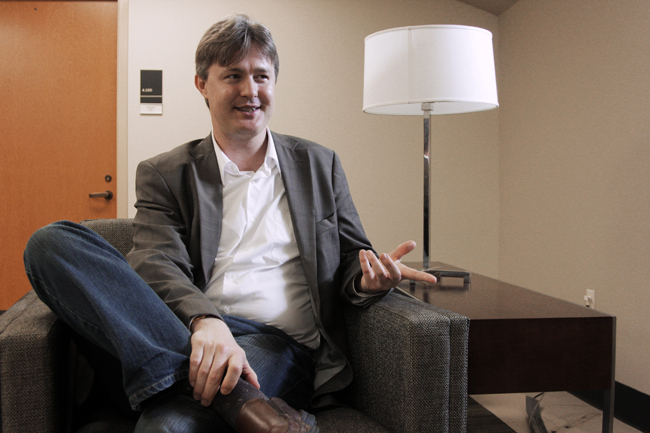Whether people sip coffee, chug energy drinks, or smoke cigarettes, caffeine and nicotine influence their states of mind and culture.
On Monday, scholars Brian Cowan, a faculty member of McGill University, and Mary Neuberger, director of the department of Slavic and Eurasian studies, gave a talk regarding the cultural importance of coffee houses.
Cowan presented his working paper titled “Transnational and Comparative Histories and Sociability.” Neuberger responded to the paper, drawing on her expertise in the culture of smoking in Eastern Europe.
Cowan and Neuberger referred to themselves as “commodity historians” who study society’s relation to consumer goods. The history of commodities is a booming area for research, Cowan said.
“Many historians are getting into it,” Cowan said. “It’s a flourishing field.”
Neuberger said commodities deserve more attention because they are a useful way to approach cultural history.
“Historians have looked at the past through wars and politics,” she said.
“But in a consumer society like ours, the production and consumption of commodities can totally transform a region.”
Change also occurs in the opposite direction, Cowan said. The way coffee is consumed is affected by the larger culture, he said. For instance, Austin’s coffee houses reflect the city’s laid-back culture, he said.
“I’ve only been in Austin for a few weeks and my experience is limited to Quacks and Caffe Medici,” Cowan said. “But I’ve noticed that people hang out in coffee houses here all the time. A lot of people are doing work — studying, writing a novel or coding software — but there’s definitely a slacker culture.”
Coffee houses in Austin cater to the same needs that coffee houses historically served, Cowan said.
“For a lot of students and entrepreneurs, the coffee house is their office, and that’s exactly what was going on in the 17th and 18th centuries” he said. “That’s an aspect of coffee house culture that still exists. People still need a place to go outside of the house, to be in public but also get their business done. Coffee houses are what’s called a third space — somewhere between the workplace and home.”
Cowan likened Austin’s coffee house culture to what he observed in Portland.
“I lived in Portland during the 90’s, when I was earning my B.A., and I saw all this stuff,” he said. “Austin is just like a spicy Portland.”
Coffee is here to stay, but the culture of smoking is now under siege, although tobacco use was not always demonized, Neuberger said.
“The proposed UT smoking ban does not make a huge difference because tobacco has already been so thoroughly demonized,” she said.
“However, it was only a few decades ago when professors smoked in class.”
Cigarettes and the world wars changed the way tobacco was used and perceived, Neuberger said.
“Tobacco was not demonized until the introduction cigarettes because there was no widespread cancer before cigarettes,” she said. “Cigarrette consumption spiked after the world wars because soldiers were issued cigarettes, and cigarettes became associated with feminine liberation for women at home. Cigarettes sped up consumption because tobacco could be smoked faster and in more places.”
Despite its demonization, smoking tobacco might never go away, said Neuberger.
“Though it’s been culturally pushed out in the United States and in the European Union, it persists and has become associated with an edgy counterculture,” she said.





















